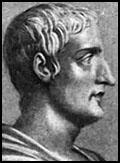Tacitus

Gaius Cornelius Tacitus was probably born in Vasio, Italy in about AD 55. He studied rhetoric under Quintilian. A fellow student was his life-long friend, Pliny the Younger. He also served as a legionary officer.
An outstanding orator he rose to eminence as a pleader at the Roman Bar. In AD 77 he married the daughter of Agricola. He also served as tribune under Titus (80- 81). He was a quaestor (82), praetor (88) and consul (97).
In 99 Tacitus joined forces with Pliny the Younger in the prosecution of Marius Priscus. Both men received a special vote of thanks from the senate for their conduct of the case. Tacitus held several important posts before being appointed governor of the Roman province of Asia by Emperor Trajan.
Tacitus is considered the most important historian of the Roman Empire. Although Tacitus often expressed strong opinions on the events that he wrote about, he is respected for his analysis of a wide range of sources, including the work of other historians, biographies, interviews, pamphlets, speeches, minutes of the Senate and inscriptions. Most of these sources have not survived.
Books by Tacitus include On the Origin and Country of the Germans (AD 98), On the Life of Julius Agricola (AD 98), Dialogue on Orators (c. AD 105) and Histories (c. AD 106). His most famous book is Annals of Imperial Rome, a history of the Roman Empire from Augustus to Nero.
Gaius Cornelius Tacitus died in AD 120.
Primary Sources
(1) Tacitus, The Annals of Imperial Rome (c. AD 118)
Prasutagus, king of the Iceni... made the emperor co-heir with his own two daughters. Prasutagus hoped by this submissiveness to preserve his kingdom and household from attack when he died. But it turned out otherwise. Kingdom and household alike were plundered by the Roman army. His widow Boudicca was flogged and their daughters raped... The Britons enjoyed plundering and thought of nothing else. Bypassing forts and garrisons, they made for where loot was richest and protection weakest. Roman deaths at (Colchester, London, St. Albans) are estimated at 70,000... They could not wait to cut throats, hang, burn, and crucify... Suetonius Paulinus decided to attack without further delay.
(2) Tacitus, On the Life of Julius Agricola (c. AD 98)
The physique of the people presents many varieties; the red hair and the large limbs of the inhabitants of Caledonia proclaim their German origin; the swarthy faces of the Silures, the curly quality, in general, of their hair, and the position of Spain opposite their shores, suggests the passage of Spanish people in old days... Those people, who adjoin Gaul are also like Gauls...
Their strength lies in their infantry; but certain tribes also fight from chariots. Originally the people were subject to kings; now the quarrels and ambitions of petty chieftains divide them; we do not have a more effective weapon than this, they have no common purpose, rarely will two or three tribes join together to repulse a common danger.
Britain produces gold and silver and other metals: conquest is worth while. Their sea also produces pearls, but somewhat clouded.
(3) In his book The Annals of Imperial Rome, Tacitus, described what happened when the Roman historian, Cremutius Cordus, criticised the power of the emperors. (c. AD 118)
The Senate ordered his books to be burnt by the aediles. But they survived, first hidden and later republished... the stupidity of people who believe that today's authority can destroy tomorrow's memories.
